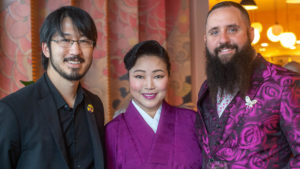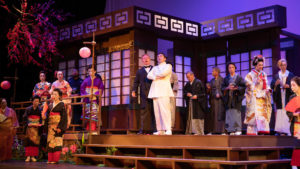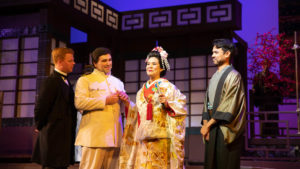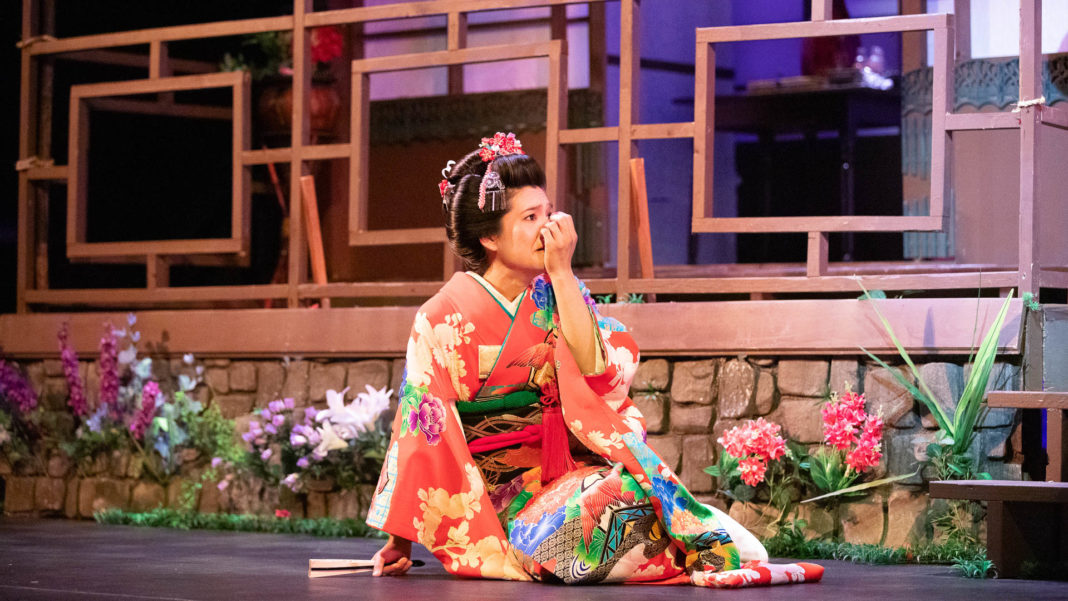If you are an opera purist, you can stop reading. If you believe that innovation is a wonderful thing in opera or you think opera is only for the elite, continue reading. For we’re going to talk to an opera director whom many would consider to be a disruptor. Imagine Mozart’s The Magic Flute set in the world of 1990s video games. Or Abduction from the Seraglio set in the Star Trek universe. Or a Madama Butterfly with a libretto rewritten so that Japanese characters speak in their native language as do the English characters in theirs. This is the work of Josh Shaw, the Executive and Artistic Director of Pacific Opera Project.
Over the weekend, Pacific Opera Project, or POP, opened its production of Puccini’s Madama Butterfly. The new libretto was written by Shaw and Eiki Isomura. There are two performances this weekend at the Aratani Theatre in Little Tokyo before the show moves to Houston’s Opera in the Heights for additional performances. Isomura is the Artistic Director there and this is a co-production between the two companies. Sunday’s matinee is sold out, but a limited number of tickets were still available for Saturday night’s performance at press time.

POP was founded in 2011. Each production they do is site-specific and involves and re-thinking of opera conventions in an effort to make opera more accessible. They also live-stream many of their productions.
I spoke with Shaw while he was deep into rehearsals for Madama Butterfly about his unique way of presenting opera and how his specific ideas for Puccini’s opera came to be.
You’ve wanted to do this bilingual, non-Italian production of Puccini’s opera for quite some time. How does the production mirror those original thoughts you had?

The vision is still the same. There were so many ideas, I can’t tell you where it came from. It wasn’t one day I had an epiphany and suddenly I wanted to do Madama Buttefly in English and Japanese. It probably began when I was singing Pinkerton. It hit me how illogical the plot was and that slowly developed into this idea.
What appeared illogical to you?
How are these two people talking to each other? We accept that as a given because we know the story, but if you take the story and take a step back and look at it, there’s no way they could be speaking the same language. It is a great opera. It’s one of the best operas. I was in the show twice before I ever thought this doesn’t work on paper.
What were the challenges in maintaining the integrity of Puccini’s music while reworking the libretto to suit both Japanese and enlightening?
I’ve written several translations from whatever language to English and, in general, I’ll change whole meanings of songs to make them funny or work better. In this production, for what I wrote, I really tried to stick as close to the original libretto as I possibly could. I know in the English section it is very close. It’s sung 2/3 in English and 1/3 in Japanese, but he [Isomura] is doing well. It felt like cheating to change the meaning to work within our context.
In changing the language, what does your production ultimately say about love and our ability to communicate with something other than language?

I always love to discuss and debate Madama Butterfly. Did these two people really love each other? She loves him, but did he love her? Was it infatuation or is he really a prick? That’s what I’m trying to show with this production. You’ll have an even stronger opinion on that as presented as if it really happened. On the night they got married, they really couldn’t directly communicate. Each audience member gets to see and make their own opinions about that.
Why do you think we, as a culture, respond so strongly to love stories where the couple does not end up together?
Nobody wants to see a show about the day nothing ever happened. I stole that from one of my teachers. I think most people have been in some situation where they are madly in love and it doesn’t work out for one reason or another – sometimes very serious consequences. In opera, we take it one step further and somebody dies. We want to go and be entertained.
This production also marks your first grant from the National Endowment for the Arts. Do you think your passion for inclusiveness landed at the right time?
Yes it did. I have many opinions of color-blind casting and what should and shouldn’t be happening. But that’s a by-product of this production and not the impetus for it.
[It should be noted that Madama Butterfly has all Japanese-American singers for all the Japanese roles and for the chorus as well.]
If the creators of Madama Butterfly saw your production, what do you think they would say?
We’ve done all these updated Mozart comedies and I always say Mozart would love it. He was trying to speak to the people at the time and we’re doing the same. I’m not so sure about Puccini. He might say, “My masterpiece. What have you done to it?” I don’t care. The music is still the same. People have been changing librettos to their native tongue since they were written. I hope they would say, “Thank you for keeping this alive and going into the future.”
Main Photo: Janet Todd in Madama Butterfly. (Photo by Mike Tomasulo)












